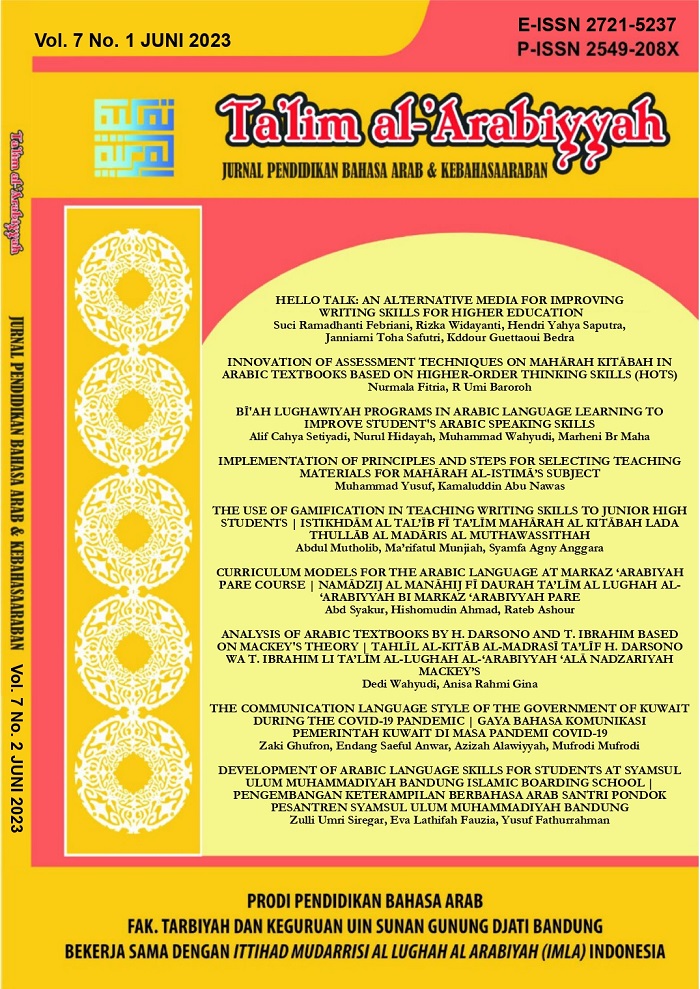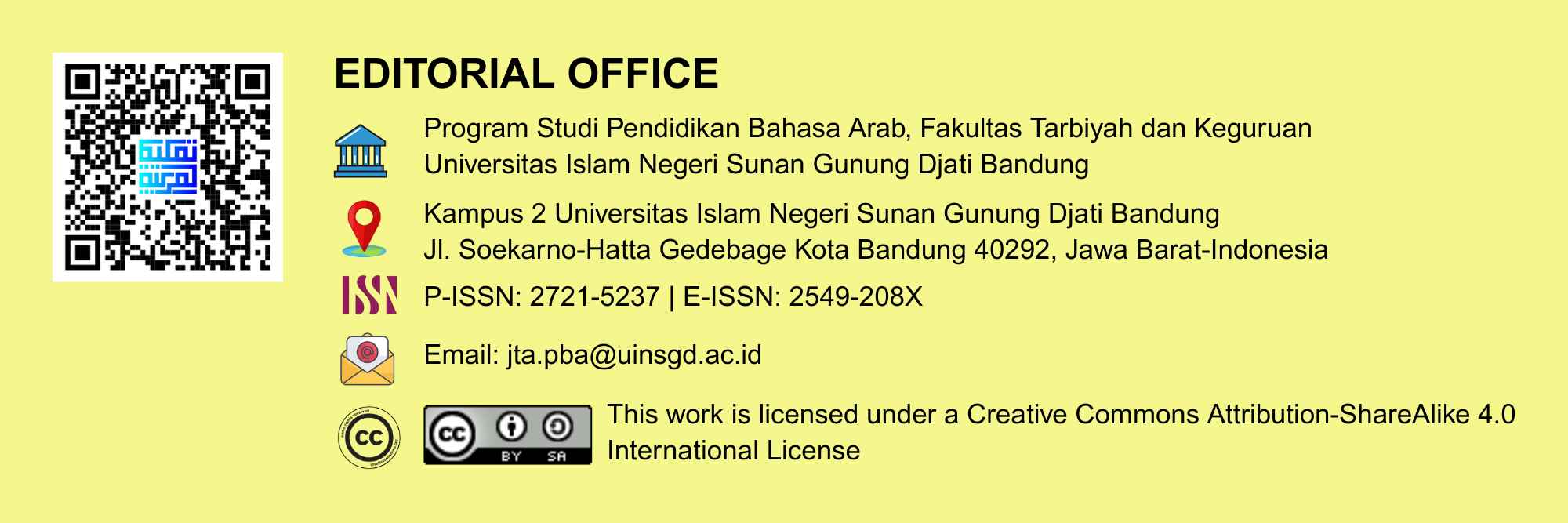Hello Talk: An Alternative Media for Improving Writing Skills for Higher Education
DOI:
https://doi.org/10.15575/jpba.v7i1.23661Keywords:
Creativity, Critical Thinking, Hello Talk, Writing SkillsAbstract
Productive language skills are an indicator of student success in using foreign languages. The lack of media allows students to interact with native speakers. It encourages researchers to analyze holistically how to use the HelloTalk application as an alternative media for increasing writing skills. This study used a qualitative descriptive research design—data collection techniques through observation, interview, and documentation. The data collection tools are based on pre-test and post-test scores, observation sheets, and a list of questions from interviews. The analysis technique used is Milles Huberman's theory. The results show that the HelloTalk application can provide opportunities for students to increase creativity and critical thinking. The ability students' showed an increase in score to 75.3. This result is indicated by using chat themes in broader writing skills and interaction with native speakers to explore information on the language being learned. In addition, the process of correcting writing errors can be corrected immediately. The findings of this research indicate that using the HelloTalk application increases the intensity of Arabic writing skills. This study recommends further research to test the effectiveness of the HelloTalk application against other foreign language skills with more varied research methods.
References
Al Masaeed, K. (2020). Translanguaging in L2 Arabic Study Abroad: Beyond Monolingual Practices in Institutional Talk. The Modern Language Journal, 104(1). 250-266. https://doi.org/10.1111/modl.12623
Alfaro, L., Rivera, C., Luna-Urquizo, J., Castaneda, E., Zuniga-Cueva, J., & Rivera-Chavez, M. (2021). New Trends in e-Technologies and e-Learning. 2021 IEEE World Conference on Engineering Education (EDUNINE), 1–6. https://doi.org/10.1109/EDUNINE51952.2021.9429120
Alghamdi, M. A. (2018). Arabic Learners' Preferences for Instagram English Lessons. English Language Teaching, 11(8), 103-110. https://doi.org/10.5539/elt.v11n8p103
Al-Husban, N. A., & Tawalbeh, M. (2023). EFL Teachers' Practices and Perspectives on Learner Autonomy in Virtual Language Learning Environments in Jordan. International Journal of Language Education, 1(1), 1-12. https://doi.org/10.26858/ijole.v1i1.36156
Aruan, L., Sari, R., & Bengar Harahap, A. (2020). Using Prezi Online Software to Improve Teaching Listening Skill. International Journal of Education and Literacy Studies, 8(1), 104-108. https://doi.org/10.7575/aiac.ijels.v.8n.1p.104
Bahruddin, U., & Febriani, S. R. (2020). Student's perceptions of Arabic online learning during COVID-19 emergency. Journal for the Education of Gifted Young Scientists, 8(4), 1483–1492. https://doi.org/10.17478/jegys.763705
Chawla, B., & Singh, R. (2017). Recent Advances and Challenges in the Management of Retinoblastoma. Indian Journal of Ophthalmology, 65(2), 133–139. https://doi.org/10.4103/ijo.IJO_883_16
DoÄekal, V., & Tulinská, H. (2015). The Impact of Technology on Education Theory. Procedia - Social and Behavioral Sciences, 174 (1), 3765–3771. https://doi.org/10.1016/j.sbspro.2015.01.1111
Fathurrochman, I. (2021). Online Evaluation System in the Pandemic Disruption in Madrasah: Opportunities and Challenges Based on Qualitative Report. Jurnal Iqra’ : Kajian Ilmu Pendidikan, 6(2), 184–197. https://doi.org/10.25217/ji.v6i2.983
Febriani, S. R., Wargadinata, W., & Syuhadak, S. (2021). Mingle Model for Increasing Productive Language Skills and Relationship with Student's Personality Based on Jung Theory. Ta’lim Al-’Arabiyyah: Jurnal Pendidikan Bahasa Arab & Kebahasaaraban, 5(1), 35–51. https://doi.org/10.15575/jpba.v5i1.12184
Guillén, G., Sawin, T., & Avineri, N. (2020). Zooming Out of The Crisis: Language and Human Collaboration. Foreign Language Annals, 53(2), 320–328. https://doi.org/10.1111/flan.12459
Gulzar, Z., & Leema, A. A. (2018). Course Recommendation Based on Query Classification Approach. International Journal of Web-Based Learning and Teaching Technologies, 13(3), 69–83. https://doi.org/10.4018/IJWLTT.2018070105
Hamat, A., & Hassan, H. A. (2019). Use of Social Media for Informal Language Learning by Malaysian University Students. 3L: Language, Linguistics, Literature, 25(4), 68–83. https://doi.org/10.17576/3L-2019-2504-05
Harjali, H. (2019). Building Constructivist Learning Environment at Senior High School in Indonesia. The Qualitative Report, 24(9), 2197–2214. https://doi.org/10.46743/2160-3715/2019.4001
Harun, U. B. (2020). Project-Based Learning Integrated to STEM (STEM-PJBL) to Enhance Arabic Learning HOTS-Based. Al-Bidayah: Jurnal Pendidikan Dasar Islam, 12(1), 139–150. https://doi.org/10.14421/al-bidayah.v12i1.230
Hembrough, T., & Jordan, J. (2020). Creating a Digital Writing Classroom: A Mixed Methods Study About a First-Year Composition Tablet Initiative. International Journal of Instruction, 13(2), 567–586. https://doi.org/10.29333/iji.2020.13239a
Kabassi, K., Dragonas, I., Ntouzevits, A., Pomonis, T., Papastathopoulos, G., & Vozaitis, Y. (2016). Evaluating a Learning Management System for Blended Learning in Greek Higher Education. SpringerPlus, 5(1), 1–12. https://doi.org/10.1186/s40064-016-1705-8
Koh, J. H. L., Chai, C. S., Benjamin, W., & Hong, H. Y. (2015). Technological Pedagogical Content Knowledge (TPACK) and Design Thinking: A Framework to Support ICT Lesson Design for 21st Century Learning. Asia-Pacific Education Researcher, 24(3), 535–543. https://doi.org/10.1007/s40299-015-0237-2
Lai, W., & Wei, L. (2019). A Critical Evaluation of Krashen's Monitor Model. Theory and Practice in Language Studies, 9(11), 1459-1464. https://doi.org/10.17507/tpls.0911.13
Lenkaitis, C. A. (2019). Technology as a Mediating Tool: Videoconferencing, L2 Learning, and Learner Autonomy. Computer Assisted Language Learning, 33(5), 483-509. https://doi.org/10.1080/09588221.2019.1572018
Liu, X., Li, L., & Zhang, Z. (2017). Small Group Discussion as a Key Component in Online Assessment Training for Enhanced Student Learning in Web-Based Peer Assessment. Assessment and Evaluation in Higher Education, 43(2), 207-222. https://doi.org/10.1080/02602938.2017.1324018
Misra, S., Cheng, L., Genevie, J., & Yuan, M. (2016). The iPhone Effect: The Quality of In-Person Social Interactions in the Presence of Mobile Devices. Environment and Behavior, 48(2), 275–298. https://doi.org/10.1177/0013916514539755
Moeller, A. J., & Catalano, T. (2015). Foreign Language Teaching and Learning. International Encyclopedia of the Social & Behavioral Sciences: Second Edition, 327–332. https://doi.org/10.1016/B978-0-08-097086-8.92082-8
Muranova, O. (2016). New Media and Perennial Problems in Foreign Language Learning and Teaching. CALICO Journal, 34(3), 380–383. https://doi.org/10.1558/cj.32173
Musthafa, I., & Hermawan, A. (2018). Metodologi Penelitian Bahasa Arab: Konsep Dasar Strategi Metode Teknik. Remaja Rosdakarya.
Pangondian, R.A., Santosa, P.I., & Nugroho, E. (2019). Faktor-Faktor yang Mempengaruhi Kesuksesan Pembelajaran Daring dalam Revolusi Industri 4.0. Seminar Nasional Teknologi Komputer &Sains (SAINTEKS), 1(2), 56–60. Retrieved from http://prosiding.seminar-id.com/index.php/sainteks/article/view/122
Pardede, P. (2020). Integrating The 4Cs into EFL Integrated Skills Learning. JET (Journal of English Teaching), 6(1), 71–85. https://doi.org/10.33541/jet.v6i1.190
Peters, E., Noreillie, A. S., Heylen, K., Bulté, B., & Desmet, P. (2019). The Impact of Instruction and Out-of-School Exposure to Foreign Language Input on Learners' Vocabulary Knowledge in Two Languages. Language Learning, 69(3), 747–782. https://doi.org/10.1111/lang.12351
Rose, E., Weinert, S., & Ebert, S. (2018). The Roles of Receptive and Productive Language in Children's Socioemotional Development. Social Development, 27(4), 777–792. https://doi.org/10.1111/sode.12317
Samand, S. M., Sailan, Z., & Lio, A. (2019). Analysis On The Relationship Of Extrovert-Introvert Personality And Students' Speaking Performance In English Study Program Of Halu Oleo University. Journal of Language Education and Educational Technology (JLEET), 4(1), 1-15. https://doi.org/10.33772/jleet.v4i1.6677
Serumena, D. R., Utan, F. M., & Poernomo, M. H. (2021). The Effectiveness of social media as an Online Learning Pattern in Improving the 3 Domains of Student Intellectual Ability During the Pandemic (Covid-19). 2nd Borobudur International Symposium on Science and Technology (BIS-STE 2020), 203, 425–433. https://doi.org/10.2991/aer.k.210810.074
Suellem, E. (2018). Interlanguage in The Process of Learning Brazilian Portuguese in Tandem Modality by Using Hello Talk App. Brazilian English Language Teaching Journal, 9(1), 207–222. http://dx.doi.org/10.15448/2178-3640.2018.1.31991
Teske, K., & Vollmer Rivera, A. (2018). A Critical Exploration of Heritage Language Learners' Identities within Hellotalk. Revista Do GEL, 15(3), 279–301. https://doi.org/10.21165/gel.v15i3.2399
Tudini, V. (2018). Interactivity in the Teaching and Learning of Foreign Languages: What it Means for Resourcing and Delivery of Online and Blended Programmes. Language Learning Journal, 46(2), 132–145. https://doi.org/10.1080/09571736.2014.994183
Valizadeh, M. (2022). Collaborative Writing on Google Docs: Effects on EFL Learners' Descriptive Paragraphs. IJELTAL (Indonesian Journal of English Language Teaching and Applied Linguistics), 6(2), 277–287. https://doi.org/10.21093/ijeltal.v6i2.1053
Zheng, B., Yim, S., & Warschauer, M. (2017). Social Media in The Writing Classroom and Beyond. The TESOL Encyclopedia of English Language Teaching, 1–5. John Wiley & Sons, Inc. https://doi.org/10.1002/9781118784235.eelt0555
Downloads
Published
How to Cite
Issue
Section
Citation Check
License
Authors who publish in Ta'lim al-'Arabiyyah: Jurnal Pendidikan Bahasa Arab dan Kebahasaaraban agree to the following terms:
- Authors retain copyright and grant the journal right of first publication with the work simultaneously licensed under a Creative Commons Attribution-ShareAlike 4.0 International (CC BY-SA 4.0) License that allows others to share the work with an acknowledgment of the work's authorship and initial publication in this journal.
- Authors are able to enter into separate, additional contractual arrangements for the non-exclusive distribution of the journal's published version of the work (e.g., post it to an institutional repository or publish it in a book), with an acknowledgment of its initial publication in this journal.
- Authors are permitted and encouraged to post their work online (e.g., in institutional repositories or on their website) prior to and during the submission process, as it can lead to productive exchanges, as well as earlier and greater citation of published work (See The Effect of Open Access).
![]()
Ta'lim al-'Arabiyyah: Jurnal Pendidikan Bahasa Arab dan Kebahasaaraban is licensed under a Creative Commons Attribution-ShareAlike 4.0 International License.
Based on a work at https://journal.uinsgd.ac.id/index.php/Talim








